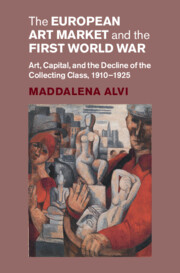 The European Art Market and the First World War
The European Art Market and the First World War Published online by Cambridge University Press: 10 April 2025
The fragmentation of the European art market after the First World War resulted not only from the war itself but also from deliberate legislative choices. Post-1918 legislation was enacted in a climate of emergency, influenced by the imperative to generate fiscal revenue and protect art. Paris’s decline as an art hub was exacerbated by well-meaning but ill-conceived export and tax regulations, hindering its ability to regain pre-war prominence. Fears of economic and political seizure influenced Weimar policymakers, worsening German isolation. In contrast, Britain opted for minimal postwar intervention. These legislative approaches reflected different economic trajectories as much as they did postwar mentalities. The state’s attempt to protect art, extract profit from it, and avoid economic and cultural expropriation was a symptom of postwar nationalisation. It dealt the final blow to an already weakened European auction system.
To save this book to your Kindle, first ensure [email protected] is added to your Approved Personal Document E-mail List under your Personal Document Settings on the Manage Your Content and Devices page of your Amazon account. Then enter the ‘name’ part of your Kindle email address below. Find out more about saving to your Kindle.
Note you can select to save to either the @free.kindle.com or @kindle.com variations. ‘@free.kindle.com’ emails are free but can only be saved to your device when it is connected to wi-fi. ‘@kindle.com’ emails can be delivered even when you are not connected to wi-fi, but note that service fees apply.
Find out more about the Kindle Personal Document Service.
To save content items to your account, please confirm that you agree to abide by our usage policies. If this is the first time you use this feature, you will be asked to authorise Cambridge Core to connect with your account. Find out more about saving content to Dropbox.
To save content items to your account, please confirm that you agree to abide by our usage policies. If this is the first time you use this feature, you will be asked to authorise Cambridge Core to connect with your account. Find out more about saving content to Google Drive.